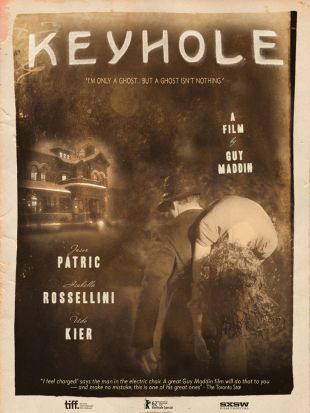
Perhaps there's actual meaning to be found in Keyhole, Canadian visionary Guy Maddin's haunting gangster melodrama, yet despite all of the stunning black-and-white cinematography, seductively surreal imagery, and occasionally hilarious abstract humor, odds are it's likely to be lost on all but the auteur's most ardent fans. But make no mistake, that's certainly not to say there isn't value in what Maddin has to offer, just that the audience willing and able to receive it is bound to be limited by definition.
Late one night, a group of gangsters shoot their way into the living room of a large house and wait anxiously for the arrival of their leader, Ulysses Pick (Jason Patric). Ulysses has a knack for getting out of tense situations, and with the cops surrounding them his cohorts need him now more than ever. But when Ulysses arrives with a teenage girl and a bound young man in tow, some of his henchmen start to think it's time for a new boss to take over. An already tense situation turns downright surreal as Ulysses begins venturing through the labyrinthine house in search of his wife Hyacinth (Isabella Rossellini), who remains locked in her room somewhere on an upper floor. Meanwhile, Hyacinth's father offers cryptic commentary on the unfolding events, and the harder Ulysses searches for his wife, the more secrets he begins to uncover about this eccentric family.

Few contemporary directors possess such a bold, singularly unique vision as Maddin, and since the mid-'80s he's built an impressive body of work distinguished by the juxtaposition of dazzling imagery with darkly comic themes and dialogue. He's drawn favorable comparisons to celebrated American director David Lynch for his ability to tell a compelling story within a dreamlike framework, but as with Lynch, this style can occasionally prove to be a hurdle that prevents the audience from connecting with the story on an emotional level. That's most certainly the case with Keyhole -- a film in which there seems to be an impenetrable, invisible wall made of stilted dialogue and uncomfortable imagery that purposefully keeps the viewer from connecting with the characters' inner turmoil -- but it's hard to fault Maddin since that's more likely because of audience expectations rather than his narrative intention.
Yet for those willing and able to shed the perception that a film should always make sense or present situations that we can relate to (the result of traditional storytelling techniques coming to define the medium), Keyhole could be something of a transcendent experience. Odds are we've all felt haunted by the memories of our past on occasion, and watching Ulysses gradually work his way through a house crowded with the specters of regret, misfortune, and sorrow mirrors our own philosophical struggle to define ourselves within the context of our mortality. If all this sounds a bit too morose or intellectually challenging, perhaps it's worth noting that a recurring Yahtzee masturbation gag, the sight of Kevin McDonald as a horny ghost, and an inventive scene involving a bicycle-powered electric chair go a long way in keeping Keyhole from becoming oppressively somber. Even at a brisk 93 minutes, however, there are scenes and sequences in Keyhole that feel interminable given that we're never quite sure where the story is headed.
In the end, Maddin's films need to be experienced firsthand and then discussed with others who have witnessed the gloriously bizarre spectacle of it all. Keyhole has the feel of an intensely personal project, and the reaction each individual has to it is likely to be just as subjective as the director's intention while making it. So what are you waiting for? Stop reading about it and just watch it.
